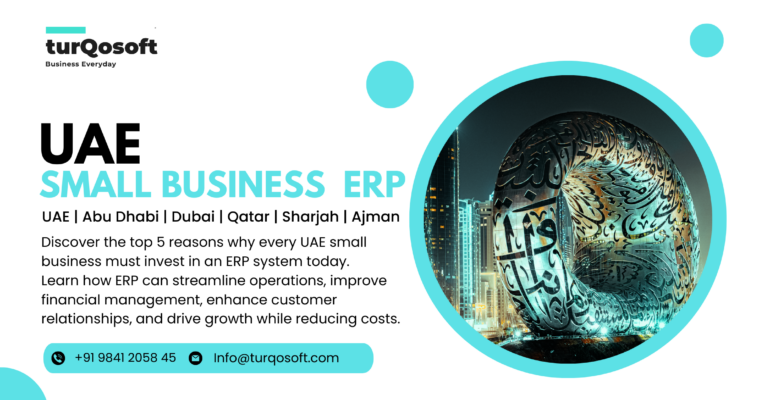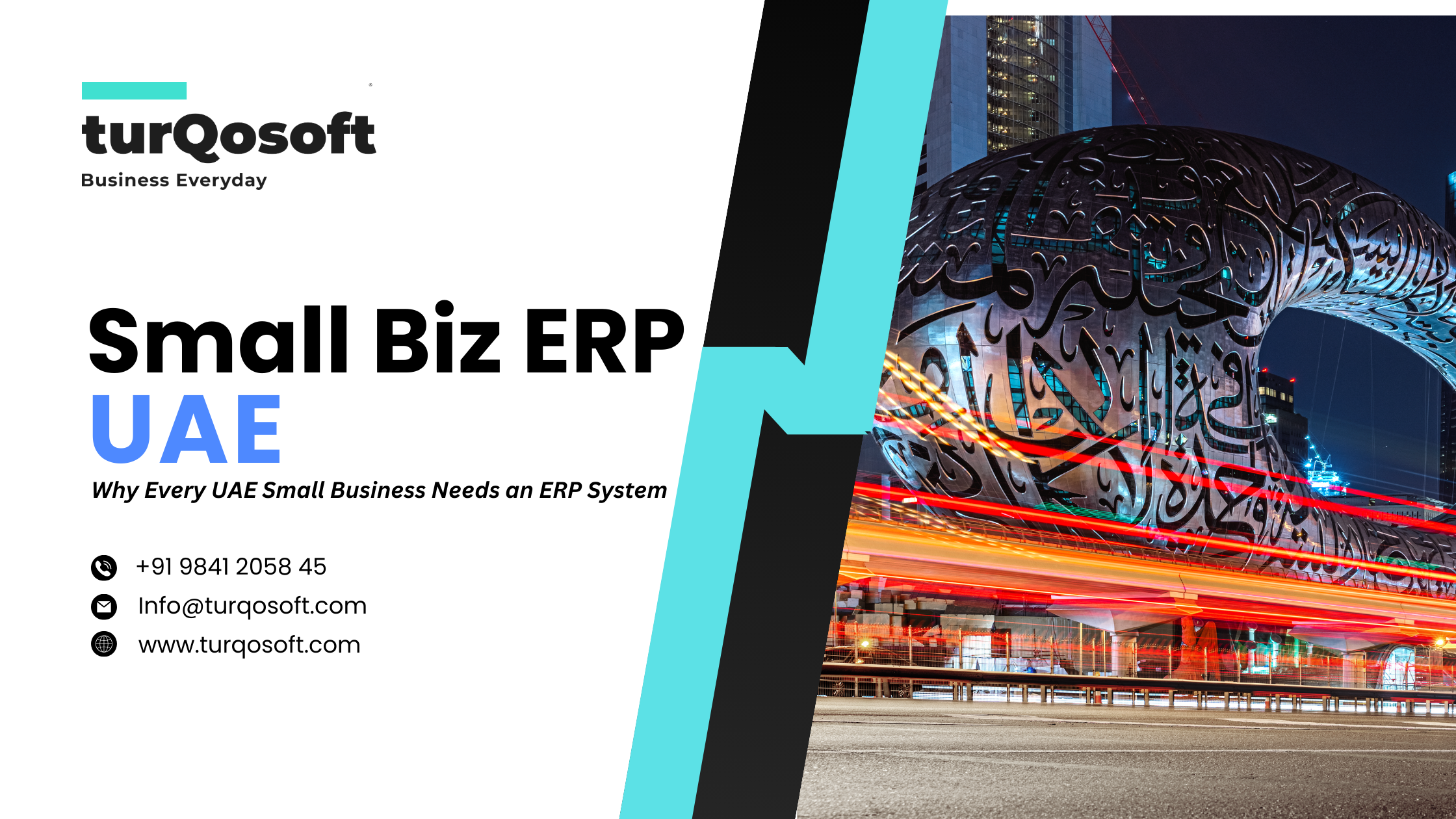5 Reasons Why Every UAE Small Business Needs an ERP System | 2025

5 Reasons Why Every UAE Small Business Needs an ERP System | 2025
The UAE’s business landscape is thriving, marked by a fast-paced economy, competitive markets, and a supportive environment for small and medium enterprises (SMEs). However, navigating this landscape is no small feat for small businesses.
The rise of technology has reshaped industries, making it an indispensable tool for growth and survival. Among the most transformative technologies is Enterprise Resource Planning (ERP) systems—an all-in-one solution designed to streamline operations, enhance efficiency, and foster scalability.

In this blog, we’ll explore five compelling reasons why every UAE small business needs an ERP system and how it can be the game-changer for your operations, customer relationships, and bottom line.
Streamlined Operations
Improved Efficiency
ERP systems are designed to automate routine tasks, freeing up valuable time for business owners and employees to focus on strategic activities. By reducing manual errors and minimizing time spent on administrative tasks, ERP systems ensure that processes are smoother and more efficient.
For instance, a local retail business in Dubai leveraged ERP software to automate inventory management, reducing stock discrepancies by 35% and improving order processing times by 50%. These improvements demonstrate how automation can significantly enhance operational efficiency.
Centralized Data Management
One of the most significant challenges small businesses face is managing fragmented data spread across multiple tools and spreadsheets. ERP systems solve this issue by providing a single source of truth for all business data.
With centralized data, decision-making becomes more accurate and less time-consuming. For example, a logistics company in Sharjah streamlined its operations by consolidating customer, inventory, and financial data into a unified platform, allowing managers to access real-time insights for better planning.
Enhanced Collaboration
Collaboration is crucial for small teams, and ERP systems facilitate seamless communication across departments. Shared access to updated data ensures that teams work together more effectively, reducing miscommunication and delays.
For instance, a marketing agency in Abu Dhabi saw a 40% improvement in project completion times after implementing an ERP system that integrated task management, client communication, and financial tracking.
Better Financial Management
Accurate Financial Reporting
For small businesses, maintaining financial accuracy is critical. ERP systems provide real-time insights into cash flow, expenses, and revenue, helping businesses stay financially healthy. With automated reporting features, errors in financial statements are significantly reduced.
Take the example of a startup in Dubai that struggled with manual bookkeeping. By adopting an ERP system, they achieved a 25% reduction in accounting errors and gained the ability to generate detailed financial reports instantly.
Budgeting and Forecasting
ERP systems come equipped with robust budgeting and forecasting tools. These tools enable small businesses to create accurate budgets, monitor expenses, and predict future financial performance based on historical data.
For example, a hospitality business in Ras Al Khaimah used ERP forecasting tools to identify seasonal demand trends, leading to a 20% increase in profitability during peak seasons.
Compliance and Risk Management
The UAE’s regulatory environment requires businesses to comply with VAT and labor laws, among others. ERP systems simplify compliance by automating tax calculations and maintaining audit-ready records.
A construction firm in Dubai implemented an ERP system to manage compliance, ensuring timely VAT submissions and reducing the risk of penalties.
Enhanced Customer Relationship Management
Improved Customer Insights
Understanding customer behavior is essential for delivering exceptional service. ERP systems collect and analyze customer data, providing actionable insights that can improve satisfaction and loyalty.
For instance, a boutique in Dubai used ERP analytics to identify buying patterns, allowing them to tailor marketing campaigns and increase repeat business by 30%.
Streamlined Sales Processes
Managing sales workflows manually can be cumbersome and error-prone. ERP systems automate the entire sales process, from lead generation to invoicing, ensuring efficiency and accuracy.
A real estate agency in Sharjah adopted an ERP system to manage client interactions and property listings, resulting in a 15% increase in closed deals.
Better Customer Support
Excellent customer support is a cornerstone of business success. ERP systems enhance customer support by providing instant access to customer histories, enabling quicker issue resolution.
For example, a tech support company in Abu Dhabi saw a 40% improvement in customer satisfaction scores after integrating ERP tools into their service desk operations.
Scalability and Growth Potential
Adapting to Market Changes
The UAE’s market is ever-evolving, and businesses must remain agile to succeed. ERP systems allow for easy adjustments to business processes, ensuring adaptability to market demands.
A food delivery service in Dubai expanded its operations seamlessly by using an ERP system to manage new delivery zones, partners, and payment methods.
Supporting Business Expansion
When small businesses grow, they often face challenges like managing multiple locations or currencies. ERP systems simplify these complexities, making expansion more manageable.
For example, a fashion retailer in Abu Dhabi expanded into Saudi Arabia using an ERP system to handle multi-currency transactions and regional tax requirements efficiently.
Future-Proofing the Business
Investing in technology like ERP ensures long-term competitiveness. Businesses that adopt ERP early can stay ahead of trends and leverage innovations like AI and IoT integrations as they become available.
A transport company in Dubai adopted an ERP system five years ago and continues to benefit from regular updates and new features that keep their operations cutting-edge.
Cost Savings and ROI
Reducing Operational Costs
ERP systems streamline processes, reduce waste, and optimize resource allocation, leading to significant cost savings.
For instance, a manufacturing unit in Sharjah saved 20% on operational costs by automating inventory tracking and order processing.
Increased Revenue Opportunities
Improved efficiency and customer insights often translate into increased sales. ERP systems enable businesses to identify new revenue streams and capitalize on them effectively.
A digital marketing firm in Dubai reported a 25% revenue increase after using an ERP system to optimize project management and client billing.
Measuring ROI Effectively
ERP investments are measurable, and businesses can track their return on investment by analyzing efficiency gains, cost savings, and revenue growth.
A logistics company in Ajman calculated a 150% ROI within two years of implementing their ERP system, thanks to better fleet management and reduced fuel costs.
Conclusion
Investing in an ERP system is no longer optional for small businesses in the UAE. From streamlining operations and enhancing financial management to improving customer relationships and enabling growth, ERP systems are a cornerstone of modern business success. By adopting ERP, small businesses can not only stay competitive but also thrive in the dynamic UAE market.
Ready for the transition? Contact us today to explore how ERPNext can transform your business operations and streamline your growth journey!
Alternatively, you can reach out to our team at info@turqosoft.com or give a call at +91 9841205845. Also, you can stay updated on more insights by following us on LinkedIn, YouTube, Facebook, Twitter, Pinterest, and Instagram.
Image Credit: Canva



Comment (1)
Zoritoler
Excellent post. I was checking continuously this blog and I am inspired! Very helpful information particularly the closing part 🙂 I maintain such information a lot. I used to be looking for this particular information for a very long time. Thanks and good luck.